Readings Newsletter
Become a Readings Member to make your shopping experience even easier.
Sign in or sign up for free!
You’re not far away from qualifying for FREE standard shipping within Australia
You’ve qualified for FREE standard shipping within Australia
The cart is loading…






We live in a world in which inconsistency is the rule rather than the exception and this is particularly true with regard to rewards and frustrations. In some cases, rewards and frustrative nonrewards appear to occur randomly for what seems to be the same behavior; in others a sequence of rewards is suddenly followed by nonrewards, or there are large rewards followed by small rewards. Sometimes we are rewarded for responding quickly, other times for responding slowly. The important common factor in these and other cases is frustration, how we learn about it and how we respond to it. Without our awareness, our long-term dispositions are shaped from infancy and early childhood by inconsistency of reward and by our reactions to discrepancy, and they are marked by changes in arousal, suppression, persistence and regression. The explanatory domain of Frustration Theory includes an area of experimental research that has evolved over some forty years. Although most of the work is with animals, it constitutes an animal model of many of the myriad human manifestations of nonreward, thwarting of purpose, and reactions to physical and emotional insult that are regarded as frustrations. This book, by the originator of the theory and the first book to be devoted solely to Frustration Theory, gives a detailed account of the theory and its ramifications and it examines the relationship between frustration symptoms and the limbic system that is thought to be the region of the brain responsible for generating these symptoms.
$9.00 standard shipping within Australia
FREE standard shipping within Australia for orders over $100.00
Express & International shipping calculated at checkout
We live in a world in which inconsistency is the rule rather than the exception and this is particularly true with regard to rewards and frustrations. In some cases, rewards and frustrative nonrewards appear to occur randomly for what seems to be the same behavior; in others a sequence of rewards is suddenly followed by nonrewards, or there are large rewards followed by small rewards. Sometimes we are rewarded for responding quickly, other times for responding slowly. The important common factor in these and other cases is frustration, how we learn about it and how we respond to it. Without our awareness, our long-term dispositions are shaped from infancy and early childhood by inconsistency of reward and by our reactions to discrepancy, and they are marked by changes in arousal, suppression, persistence and regression. The explanatory domain of Frustration Theory includes an area of experimental research that has evolved over some forty years. Although most of the work is with animals, it constitutes an animal model of many of the myriad human manifestations of nonreward, thwarting of purpose, and reactions to physical and emotional insult that are regarded as frustrations. This book, by the originator of the theory and the first book to be devoted solely to Frustration Theory, gives a detailed account of the theory and its ramifications and it examines the relationship between frustration symptoms and the limbic system that is thought to be the region of the brain responsible for generating these symptoms.